- Home
- Maggie O'Farrell
Hamnet Page 2
Hamnet Read online
Page 2
‘Hello?’ Hamnet calls. He waits. Nothing. Silence presses back at him from the dining hall and the parlour beyond. ‘Who’s there?’
For a moment, and just for a moment, he entertains the notion that it might be his father, returned from London, to surprise them – it has happened before. His father will be there, beyond that door, perhaps hiding as a game, as a ruse. If Hamnet walks into the room, his father will leap out; he will have gifts stowed in his bag, in his purse; he will smell of horses, of hay, of many days on the road; he will put his arms around his son and Hamnet will press his cheek to the rough, chafing fastenings of his father’s jerkin.
He knows it won’t be his father. He knows it, he does. His father would respond to a repeated call, would never hide himself away in an empty house. Even so, when Hamnet walks into the parlour, he feels the falling, filtering sensation of disappointment to see his grandfather there, beside the low table.
The room is filled with gloom, coverings pulled over most of the windows. His grandfather is standing with his back towards him, in a crouched position, fumbling with something: papers, a cloth bag, counters of some sort. There is a pitcher on the table, and a cup. His grandfather’s hand meanders through these objects, his head bent, his breath coming in wheezing bursts.
Hamnet gives a polite cough.
His grandfather wheels around, his face wild, furious, his arm flailing through the air, as if warding off an assailant. ‘Who’s there?’ he cries. ‘Who is that?’
‘It’s me.’
‘Who?’
‘Me.’ Hamnet steps towards the narrow shaft of light slanting in through the window. ‘Hamnet.’
His grandfather sits down with a thud. ‘You scared the wits out of me, boy,’ he cries. ‘Whatever do you mean, creeping about like that?’
‘I’m sorry,’ Hamnet says. ‘I was calling and calling but no one answered. Judith is—’
‘They’ve gone out,’ his grandfather speaks over him, with a curt flick of his wrist. ‘What do you want with all those women anyway?’ He seizes the neck of the pitcher and aims it towards the cup. The liquid – ale, Hamnet thinks – slops out precipitously, some into the cup and some on to the papers on the table, causing his grandfather to curse, then dab at them with his sleeve. For the first time, it occurs to Hamnet that his grandfather might be drunk.
‘Do you know where they have gone?’ Hamnet asks.
‘Eh?’ his grandfather says, still mopping his papers. His anger at their spoiling seems to unsheathe itself and stretch out from him, like a rapier. Hamnet can feel the tip of it wander about the room, seeking an opponent, and he thinks for a moment of his mother’s hazel strip, and the way it pulls itself towards water, except he is not an underground stream and his grandfather’s anger is not like the quivering divining rod at all. It is cutting, sharp, unpredictable. Hamnet has no idea what will happen next, or what he should do.
‘Don’t stand there gawping,’ his grandfather hisses. ‘Help me.’
Hamnet shuffles forward a step, then another. He is wary, his father’s words circling his mind: Stay away from your grandfather when he is in one of his black humours. Be sure to stand clear of him. Stay well back, do you hear?
His father had said this to him on his last visit, when they had been helping unload a cart from the tannery. John, his grandfather, had dropped a bundle of skins into the mud and, in a sudden fit of temper, had hurled a paring-knife at the yard wall. His father had immediately pulled Hamnet back, behind him, out of the way, but John had barged past them into the house without a word. His father had taken Hamnet’s face in both of his hands, fingers curled in at the nape of his neck, his gaze steady and searching. He’ll not touch your sisters but it’s you I worry for, he had muttered, his brow puckering. You know the humour I mean, don’t you? Hamnet had nodded but wanted the moment to be prolonged, for his father to keep holding his head like that: it gave him a sensation of lightness, of safety, of being entirely known and treasured. At the same time, he was aware of a curdling unease swilling about inside him, like a meal his stomach didn’t want. He thought of the snip and snap of words that punctured the air between his father and grandfather, the way his father continually reached to loosen his collar when seated at table with his parents. Swear to me, his father had said, as they stood in the yard, his voice hoarse. Swear it. I need to know you’ll be safe when I’m not here to see to it.
Hamnet believes he is keeping his word. He is well back. He is at the other side of the fireplace. His grandfather couldn’t reach him here, even if he tried.
His grandfather is draining his cup with one hand and shaking the drops off a sheet of paper with the other. ‘Take this,’ he orders, holding out the page.
Hamnet bends forward, not moving his feet, and takes it with the very tips of his fingers. His grandfather’s eyes are slitted, watchful; his tongue pokes out of the side of his mouth. He sits in his chair, hunched: an old, sad toad on a stone.
‘And this.’ His grandfather holds out another paper.
Hamnet bends forward in the same way, keeping the necessary distance. He thinks of his father, how he would be proud of him, how he would be pleased.
Quick as a fox, his grandfather makes a lunge. Everything happens so fast that, afterwards, Hamnet won’t be sure in what sequence it all occurred: the page swings to the floor between them, his grandfather’s hand seizes him by the wrist, then the elbow, hauling him forward, into the gap, the space his father had told him to observe, and his other hand, which still holds the cup, is coming up, fast. Hamnet is aware of streaks in his vision – red, orange, the colours of fire, streaming in from the corner of his eye – before he feels the pain. It is a sharp, clubbed, jabbing pain. The rim of the cup has struck him just below the eyebrow.
‘That’ll teach you,’ his grandfather is saying, in a calm voice, ‘to creep up on people.’
Tears burst forth from Hamnet’s eyes, both of them, not just the injured one.
‘Crying are you? Like a little maid? You’re as bad as your father,’ his grandfather says, with disgust, releasing him. Hamnet springs backwards, thwacking his shin on the side of the parlour bed. ‘Always crying and whining and complaining,’ his grandfather mutters. ‘No backbone. No sense. That was always his problem. Couldn’t stick at anything.’
Hamnet is running back outside, along the street, wiping at his face, dabbing the blood with his sleeve. He lets himself in through his own front door, up the stairs, to the upper room, where a figure lies on the pallet next to their parents’ big curtained bed. The figure is dressed – a brown smock, a white bonnet, the strings of which are untied and straggle down her neck – and is lying on top of the sheets. She has kicked off her shoes, which lie, inverted, like a pair of empty pods, beside her.
‘Judith,’ the boy says, and touches her hand. ‘Are you feeling any better?’
The girl’s lids lift. She stares at her brother, for a moment, as if from a great distance, then shuts her eyes again. ‘I’m sleeping,’ she murmurs.
She has the same heart-shaped face as him, the same peaked brow, where the same corn-coloured hair grows upwards. The eyes that fixed so briefly on his face are the same colour – a warm amber, flecked with gold – the same set as his own. There is a reason for this: they share a birthday, just as they shared their mother’s womb. The boy and the girl are twins, born within minutes of each other. They are as alike as if they had been born in the same caul.
He closes his fingers about hers – the same nails, the same shaped knuckles, although his are bigger, wider, grimier – and he tries to flatten the thought that hers feel slick and hot.
‘How are you?’ he says. ‘Better?’
She stirs. Her fingers curl into his. Her chin lifts, then dips. There is, the boy sees, a swelling at the base of her throat. And another where her shoulder meets her neck. He stares at them. A pair of quail’s eggs, under Judith’s skin. Pale, ovoid, nestled there, as if waiting to hatch. One at her neck, one at her shoulder.
; She is saying something, her lips parting, her tongue moving inside her mouth.
‘What did you say?’ he asks, bending nearer.
‘Your face,’ she is saying. ‘What happened to your face?’
He puts a hand to his brow, feeling the swelling there, the wet of new blood. ‘Nothing,’ he says. ‘It was nothing. Listen,’ he says, more urgently, ‘I’m going to find the physician. I won’t be long.’
She says something else.
‘Mamma?’ he repeats. ‘She – she is coming. She is not far away.’
She is, in fact, more than a mile away.
Agnes has a patch of land at Hewlands, leased from her brother, stretching from the house where she was born to the forest. She keeps bees here, in hemp-woven skeps, which hum with industrious and absorbed life; there are rows of herbs, flowers, plants, stems that wind up supporting twigs. Agnes’s witch garden, her stepmother calls it, with a roll of her eyes.
Agnes can be seen, most weeks, moving up and down the rows of these plants, pulling up weeds, laying her hand to the coils of her hives, pruning stems here and there, secreting certain blooms, leaves, pods, petals, seeds in a leather bag at her hip.
Today she has been called there by her brother, who dispatched the shepherd’s boy to tell her that something was amiss with the bees – they have left the hive and are massing in the trees.
Agnes is circling the skeps, listening for whatever the bees are telling her; she is eyeing the swarm in the orchard, a blackish stain spread throughout the branches that vibrates and quivers with outrage. Something has upset them. The weather, a change in temperature, or has someone disturbed the hive? One of the children, some escaped sheep, her stepmother?
She slides her hand up and under, into the skep, past its lip, through the remaining coating of bees. She is cool in a shift, under the dark, river-coloured shade of the trees, her thick braid of hair pinned to the top of her head, hidden under a white coif. No bee-keeper veil covers her face – she never wears one. If you came close enough, you would see that her lips are moving, murmuring small sounds and clicks to the insects that circle her head, alight on her sleeve, blunder into her face.
She brings a honeycomb out of the skep and squats to examine it. Its surface is covered, teeming, with something that appears to be one moving entity: brown, banded with gold, wings shaped like tiny hearts. It is hundreds of bees, crowded together, clinging to their comb, their prize, their work.
She lifts a bundle of smouldering rosemary and waves it gently over the comb, the smoke leaving a trail in the still August air. The bees lift, in unison, to swarm above her head, a cloud with no edges, an airborne net that keeps casting and casting itself.
The pale wax is scraped, carefully, carefully, into a basket; the honey leaves the comb with a cautious, near reluctant drop. Slow as sap, orange-gold, scented with the sharp tang of thyme and the floral sweetness of lavender, it falls into the pot Agnes holds out. A thread of honey stretches from comb to pot, widening, twisting.
There is a sensation of change, an agitation of air, as if a bird has passed silently overhead. Agnes, still crouching, looks up. The movement causes her hand to waver and honey drips to her wrist, trails over her fingers, down the side of the pot. Agnes frowns, puts down the honeycomb, and stands, licking her fingertips.
She takes in the thatched eaves of Hewlands, to her right, the white scree of cloud overhead, the restless branches of the forest, to her left, the swarm of bees in the apple trees. In the distance, her second-youngest brother is driving sheep along the bridle path, a switch in his hand, the dog darting towards and away from the flock. Everything is as it should be. Agnes stares for a moment at the jerky stream of sheep, the skitter of their feet, their draggled, mud-crusted fleeces. A bee lands on her cheek; she fans it away.
Later, and for the rest of her life, she will think that if she had left there and then, if she had gathered her bags, her plants, her honey, and taken the path home, if she had heeded her abrupt, nameless unease, she might have changed what happened next. If she had left her swarming bees to their own devices, their own ends, instead of working to coax them back into their hives, she might have headed off what was coming.
She doesn’t, however. She dabs at the sweat on her brow, her neck, tells herself not to be foolish. She places a lid on the full pot, she wraps up the honeycomb in a leaf, she presses her hands to the next skep, to read it, to understand it. She leans against it, feeling its rumbling, vibrating interior; she senses its power, its potency, like an incoming storm.
The boy, Hamnet, is trotting along the street, around a corner, dodging a horse that stands, patient, between the shafts of a cart, around a group of men gathered outside the guildhall, leaning towards each other with serious faces. He passes a woman with a baby in her arms, imploring an older child to walk faster, to keep up, a man hitting the haunches of a donkey, a dog that glances up from whatever it is eating to watch Hamnet as he runs. The dog barks once, in sharp admonishment, then returns to its gnawing.
Hamnet arrives at the house of the physician – he has asked directions from the woman with the baby – and he bangs on the door. He registers, momentarily, the shape of his fingers, his nails, and looking at them brings Judith’s to mind; he bangs harder. He thuds, he thunders, he shouts.
The door is swung open and the narrow, vexed face of a woman appears around it. ‘Whatever are you doing?’ she cries, shaking a cloth at him, as if to waft him away, like an insect. ‘That’s a racket loud enough to wake the dead. Be off with you.’
She goes to shut the door but Hamnet leaps forward. ‘No,’ he says. ‘Please. I’m sorry, madam. I need the physician. We need him. My sister – she is unwell. Can he come to us? Can he come now?’
The woman holds the door firm in her reddened hand but looks at Hamnet with care, with attention, as if reading the seriousness of the problem in his features. ‘He’s not here,’ she says eventually. ‘He’s with a patient.’
Hamnet has to swallow, hard. ‘When will he be back, if you please?’
The pressure on the door is lessening. He steps one foot into the house, leaving the other behind him.
‘I couldn’t say.’ She looks him up and down, at the encroaching foot in her hallway. ‘What ails your sister?’
‘I don’t know.’ He tries to think back to Judith, the way she looked as she lay on the blankets, her eyes closed, her skin flushed and yet pale. ‘She has a fever. She has taken to her bed.’
The woman frowns. ‘A fever? Has she buboes?’
‘Buboes?’
‘Lumps. Under the skin. On her neck, under her arms.’
Hamnet stares at her, at the small pleat of skin between her brows, at the rim of her cap, how it has rubbed a raw patch beside her ear, at the wiry coils of hair escaping at the back. He thinks of the word ‘buboes’, its vaguely vegetal overtones, how its bulging sound mimics the thing it describes. A cold fear rinses down through his chest, encasing his heart in an instant, crackling frost.
The woman’s frown deepens. She places her hand in the centre of Hamnet’s chest and propels him back, out of her house.
‘Go,’ she says, her face pinched. ‘Go home. Now. Leave.’ She goes to close the door but then, through the narrowest crack, says, not unkindly, ‘I will ask the physician to call. I know who you are. You’re the glover’s boy, aren’t you? The grandson. From Henley Street. I will ask him to come by your house, when he returns. Go now. Don’t stop on the way back.’ As an afterthought, she adds, ‘God speed to you.’
He runs back. The world seems more glaring, the people louder, the streets longer, the colour of the sky an invasive, glancing blue. The horse still stands at its cart; the dog is now curled up on a doorstep. Buboes, he thinks again. He has heard the word before. He knows what it means, what it denotes.
Surely not, he is thinking, as he turns into his street. It cannot be. It cannot. That – he will not name it, he will not allow the word to form, even inside his head – hasn’t been kn
own in this town for years.
Someone will be home, he knows, by the time he gets to the front door. By the time he opens it. By the time he crosses the threshold. By the time he calls out, to someone, anyone. There will be an answer. Someone will be there.
Unbeknown to him, he passed the maid, both his grandparents and his older sister on his trip to the physician’s house.
His grandmother, Mary, had been coming along an alleyway, down near the river, making deliveries, her stick held out to ward off the advances of a particularly peevish cockerel, Susanna behind her. Susanna had been brought along to carry Mary’s basket of gloves – deerskin, kidskin, squirrel-lined, wool-lined, embroidered, plain. ‘I don’t for the life of me know why,’ Mary had been saying, as Hamnet flashed unseen past the end of the alley, ‘you cannot at the very least look people in the eye when they greet you. These are some of your grandfather’s highest paying customers and a shred of courtesy wouldn’t go amiss. Now I do really believe that . . .’ Susanna had trailed in her wake, rolling her eyes, lugging the basket filled with gloves. Like severed hands, she was thinking, as she let her grandmother’s voice be blotted out by the sound of her own sigh, by the sight of a slice of sky cutting through the building tops.
John, Hamnet’s grandfather, had been among the men outside the guildhall. He had left the parlour and his calculations while Hamnet had been upstairs with Judith, and had been standing with his back to Hamnet as the boy ran for the physician. If the boy had turned his head as he passed, he would have seen his grandfather pushing his way into this group, leaning towards the other men, gripping their reluctant arms, urging them, teasing them, exhorting them to come with him to a tavern.
John hadn’t been invited to this meeting but had heard that it was happening so had come along in the hope of catching the men before they dispersed. He wants nothing more than to reinstate himself as a man of consequence and influence, to regain the status he once had. He can do it, he knows he can. All he needs is the ear of these men, whom he has known for years, who know him, who could vouch for his industry, his loyalty to this town. Or, if nothing else, a pardon or a blind eye from the guild and the town authorities. He was once bailiff, and then a high alderman; he used to sit in the front pew of the church and wear a scarlet robe. Have these men forgotten that? How can they not have invited him to this meeting? He used to have influence – he used to rule over them all. He used to be someone. And now he is reduced to living on whatever coin his eldest can send back from London (and what an infuriating youth he had been, hanging about the market square, squandering his time; who would have thought he would amount to anything?).

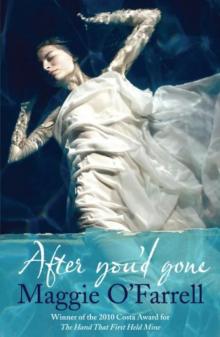 After You'd Gone
After You'd Gone The Hand That First Held Mine
The Hand That First Held Mine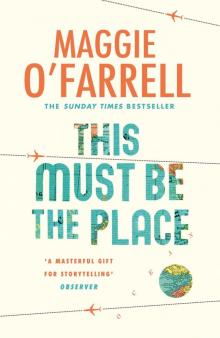 This Must Be the Place
This Must Be the Place My Lover's Lover
My Lover's Lover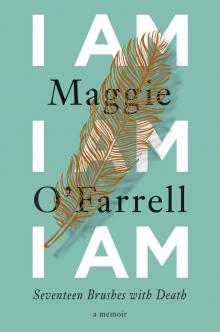 I Am, I Am, I Am: Seventeen Brushes With Death
I Am, I Am, I Am: Seventeen Brushes With Death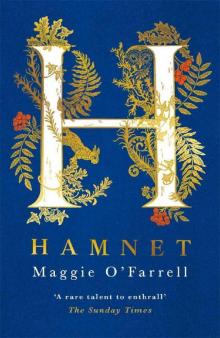 Hamnet
Hamnet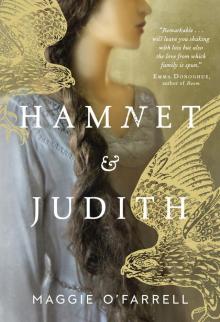 Hamnet and Judith
Hamnet and Judith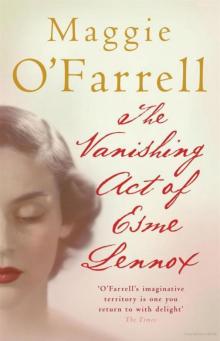 The Vanishing Act of Esme Lennox
The Vanishing Act of Esme Lennox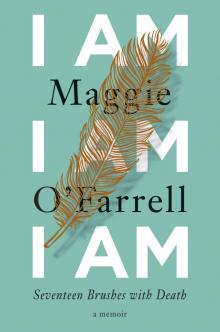 I Am, I Am, I Am
I Am, I Am, I Am